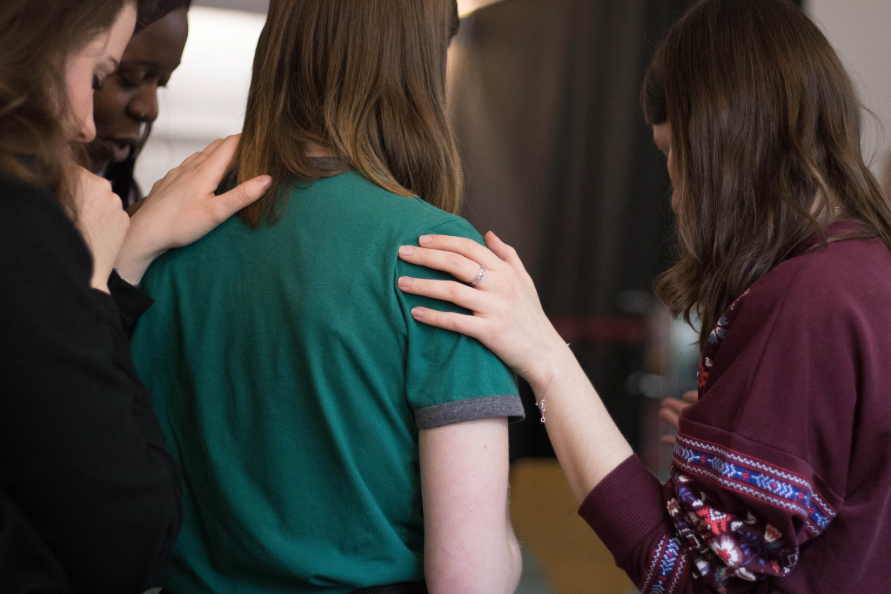Our Summit staff team is currently reading through Paul Miller’s excellent book, A Praying Life. What I love about A Praying Life is how much it stokes a passion for prayer. I always love learning about other people’s “best practices,” but when it comes to prayer, I most often find myself in need of re-inspiration. And Miller does that well.
He also tackles the two biggest problems people have with prayer head on. First, we aren’t convinced it actually works. Sometimes we pray for something, and the opposite happens. Sometimes we forget to pray for something, and it does happen. Sometimes we pray for something, and it happens … but we wonder if it would have happened anyway. It’s refreshing to hear someone admit what many of us have thought.
The other big problem we have is that we don’t really know how to construct a meaningful prayer time. You can probably relate:
The most common frustration is the activity of praying itself. We last for about 15 seconds, and then out of nowhere the day’s to-do list pops up and our minds are off on a tangent. … Instead of praying, we are doing a confused mix of wandering and worrying.
If someone wrote a story of my prayer life, it would probably be titled, A Confused Mix of Wandering and Worrying.
Fortunately, Miller also provides several helpful ways out of our prayer haze. Here are four of the biggest takeaways from A Praying Life:
1. A lack of prayer isn’t a prayer problem; it’s an idolatry problem.
Prayerlessness is the inevitable result of pride or a lack of faith—usually both. You fail to pray, instinctively, either because you are too proud to realize you need God or too unbelieving to grasp his willingness to help. As Miller puts it,
If you are not praying, then you are quietly confident that time, money, and talent are all you need in life. You’ll always be a little too tired, a little too busy. But if, like Jesus, you realize you can’t do life on your own, then no matter how busy, no matter how tired you are, you will find the time to pray.
Most approaches to correct prayerlessness skip over this heart issue. They’re law-based and end up sounding something like, “You only pray six minutes a week. And you call yourself a Christian. Stop being so terrible, and do better.” This works for a little while—or maybe a long while, if you have a disciplined temperament. But it’s bound to fail, because it’s trying to fix an idolatry problem with a law-based solution. The law can’t overcome our idolatrous hearts; only the gospel can.
The answer is not simply to “get more disciplined” or to start prayer journaling (both of which may be useful). Prayer is, in essence, a natural result of desperation and faith. When the gospel has cultivated humility and faith in us, we will obey Paul’s command to “pray continuously,” not because we’re told to, but because we are so in touch with our poverty of spirit that we can’t help asking for help.
2. Pray like a kid. Which is to say, stop self-analyzing and just talk with your Dad.
Jesus tells us to pray like children. The stories he commends about adults praying actually make them sound like children. Think about the parable of the friend who comes banging on your door at midnight and won’t leave you alone. Or the persistent widow, who keeps badgering the unjust judge until he grants her request (just to get her off his back). The heroes in these prayer stories are people who just come and talk and ask for whatever they need.
Just like our kids.
My kids don’t stop to analyze their motives before they ask me for something. They don’t ask, “Now why might I want this bicycle?” No, they just tell me what they need. Granted, the things they “need” are often ridiculous, sometimes dangerous. But they don’t mind looking silly by asking for the wrong thing. And they certainly don’t get held up by me telling them “no.” To my kids, “no” is just an annoying speed bump on the way to wearing me down with their requests.
What I worry about when I hear something like this is that we’ll become selfish when we pray. But Miller points out that this kind of praying eventually gets us closer to God’s heart than our usual method of over-thinking it:
Children never get frozen by their selfishness. They come just as they are, totally self-absorbed. Become like a little child—ask, believe, and yes, even play. How do little children ask? Without guile. They just say what is on their minds. They have no awareness of what is appropriate or inappropriate. When you stop trying to be an adult and get it right, prayer will just flow because God has done something remarkable. He’s given you a new voice. It is his own.
3. Prayer’s primary goal is being with God.
This may be the most important point in Miller’s entire book:
Oddly enough, many people struggle to learn how to pray because they are focusing on praying, not on God .… Prayer is all about relationship. It’s intimate and hints at eternity. We don’t think about communication and words but about whom we are talking with. Prayer is simply the medium through which we experience and connect to God.
Being with God is more important than reading him a laundry lists of requests. He already knows them anyway. And Jesus made it very clear that we gain nothing by puffing up our prayers to be longer.
God uses our prayers to change things, but the right prayers come just from being with him. One prayer rightly prayed is worth far more than millions of words that don’t come from fellowship with him.
More than anything else in Miller’s book, this has made me want to pray. My life can be hectic, and adding prayer as one more thing seems to make life more stressful, not less. But when we approach prayer as a way of spending time with our loving Father, it becomes something that brings calm and confidence in the midst of busyness.
I love how he describes this combination:
Learning to pray doesn’t offer us a less busy life [because if you love people you will be busy!]; it offers us a less busy heart. In the midst of outer busyness we can develop an inner quiet. Because we are less hectic on the inside, we have a greater capacity to love. … By spending time with our Father in prayer, we integrate our lives with his, with what he is doing in us. Our lives become more coherent. They feel calmer, more ordered, even in the midst of confusion and pressure.
4. Don’t look for a spiritual solution to a practical problem.
I want to make sure you read point #1. The root of most of our prayer problems is spiritual. We are idolaters, worshiping the wrong things. Unless God changes our heart, we’ll never be able to fruitfully change our habits.
But we aren’t just souls; we’re embodied creatures, which means that as much as we desire to pray, without a plan, it’s not likely to happen.
In this way, praying is a lot like spending time with my wife and kids or going to the gym. I legitimately want to do these things. And I enjoy them more than most other activities. But without a plan, the time in my day gets eaten up really quickly. So I carve out time to be home with my family—not because I need the discipline to overcome some lack of desire. Quite the opposite, the desire fuels the discipline.
The same is true of our prayer habits. If you find yourself legitimately wanting to pray but can never find the time, it can’t hurt to try Miller’s simple suggestions for beginning a prayer time in the morning:
- Get to bed. What you do in the evening shapes what you do in the morning. “Morning J.D.” is amazing. He’s focused. He gets things done. He can pray for nearly 30 seconds without distraction. “Evening J.D.” is nearly worthless. The best thing “Evening J.D.” can do is set “Morning J.D.” up well.
- Get up. Praying in bed is wonderful. But you’ll never develop a morning prayer time in bed.
- Get awake. Maybe you need to make a pot of coffee or take a shower to wake yourself up. Go ahead and shake the cobwebs off.
- Get a quiet place. There’s a reason Jesus told people to go into a room and shut the door to pray. It may not be a room for you. Maybe you do better going for a walk. The key here is to find a place without interruptions.
- Get comfortable. That is, don’t feel like you have to pray on your knees. Miller points out that, for a while, he thought he needed to pray on his knees. But he would soon start aching and couldn’t focus.
- Get going. Five minutes today is better than 30 minutes tomorrow—mostly because that “30 minutes tomorrow” may not materialize. Start with a small goal that you can actually attain.
- Keep going. Consistency is more important than length. Praying five minutes a day, every day will have more of an impact than praying for an hour today and then not coming back to it for another three months.
What about you? What has helped most in your prayer life?


